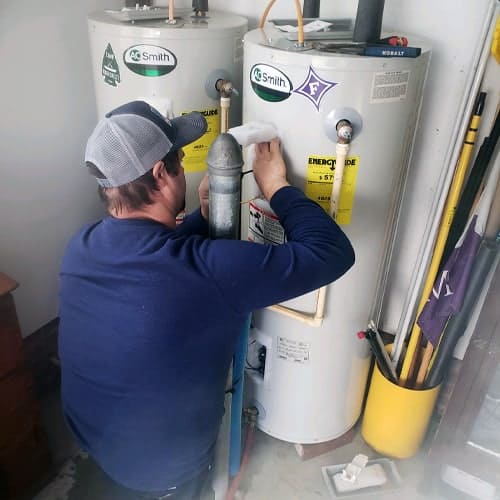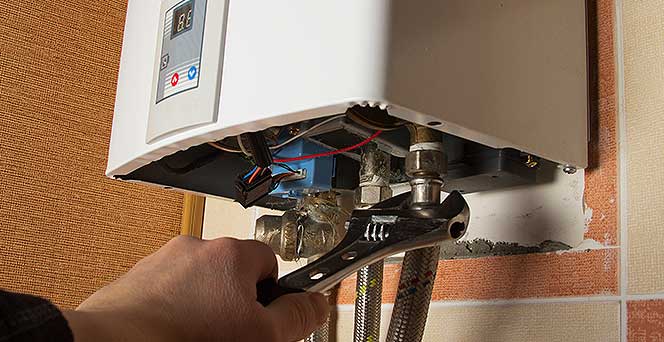Do you find yourself on the lookout for help and advice about What Do You Do When Your Water Heater Bursts??

Whether it is located in the basement or a different room, busted water heaters can trigger stress and anxiety. Having no hot water supply is likewise troublesome.
Call the Plumber
After doing the very first two safety actions, you have to call your plumber to come right away to deal with a burst water heater. There are normally signs that your aging water heating system has sediment build-up in the inside.
Rather, as soon as you find these signs, have a specialist come to inspect your water heating unit tank. Usually, water heating units have a life-span of about 8 to 12 years.
Cut Off the Cold Water Supply
Cut off the storage tanks faucet water supply from the resource. This goes from your primary water line into the container. When your storage tank is in good condition, the cold water stops filling out when the storage tank is full. Because it is dripping, the water will certainly proceed to flow. Shut the valve discovered on top of the heater. Turn this clockwise to shut it off. You need to transform off that primary water supply line outside your property if you can not find it or reach it.
Shut Down Power Source
Prior to calling the plumber, shut off a gas water heater by transforming the temperature level dial. This will certainly avoid electrocution, especially if there is a leakage as water is a conductor. Usually, the heating component closes off when the water strikes a particular temperature level.
Tidy up Home
After calling the plumber, record damages by keeping in mind as well as images so you can claim your homeowner's insurance. From there, begin the immediate cleanup. Take out any kind of important items to avoid further soaking. Eliminate any kind of standing water to prevent mold as well as mold development. Use that to drain pipes the water if you have a completely submersible water pump. Otherwise, the traditional bucket approach will also function. Attempt to mop out whatever, consisting of walls as well as wall surfaces. If you have an electrical fan and also dehumidifier, maintain them going to keep air flowing. This will help discourage mold and mildew development.
Bear in mind, if you observe any concerns with your hot water heater, call the pros as soon as possible. You can not take this trouble lightly since a faulty thermostat can elevate water temperature to an alarmingly high level, bring about unintended burns. A broken heating system stress relief valve can also trigger an explosion. For finest outcomes, get a yearly check so your system obtains checked, cleansed, drained, as well as refilled, assuring optimum efficiency.
After doing the initial two security steps, you have to call your plumber to come right away to take care of a ruptured water heating system. Instead, as quickly as you spot these indications, have an expert come to inspect your water heater container. Before calling the plumber, closed off a gas water heating system by transforming the temperature level dial. If you have a submersible water pump, utilize that to drain pipes the water. Bear in mind, if you notice any type of concerns with your water heating system, call the pros right away.
Is My Water Heater Broken?
The Water Heater is Old
No appliance will last forever. This includes a home’s water heater. During its lifespan, residents are going to face a situation where a new water heater installation will be necessary. The biggest problem with this is that most people are not sure when their water heater expires. Not knowing this can lead to serious risks if the unit begins to act up due to old age.
Most makes and models of water heaters will last between eight and 10 years. While 10 years is the age when water heater replacement is highly recommended, the need to replace the unit may occur before this time or after. If the unit doesn’t show any symptoms of a problem, it is a good idea to replace it at the 10-year mark (from the manufacture date).
Some of the symptoms that indicate a new unit is needed include rusting, leaks, noises, and a failure to heat up the water. Also, note that not all units have a 10-year life expectancy. The main exception to this rule is that a gas unit will last for six to eight years.
Rusty Heater Inlet Valve or Water
While steel is the strongest material on earth, it does have a weakness – rust. If corrosion occurs on a steel surface, it will begin to spread and eat through the steel in certain areas. On water tanks and pipes that are made of steel, rust is a warning sign of an impending leak.
The issue for many is trying to figure out if the rust is coming from the water heater or the pipes that lead to the faucet. If rust is seen, it is a clear indication that water heater service from the professionals is needed.
If rusty water appears out of the faucets in the bathtub or sink, it likely means a rusty water heater. If there is rust near the water inlet or the pressure relief valve, rust has likely developed inside the tank. If tap water appears rusty, it may be an issue with the pipes.
Strange Sounds from the Water Heater
Are there strange sounds coming from the tank? As a water heater gets older, rumbling noises may develop and get louder and louder as the water in the tank heats up. In homes where large amounts of hot water are used, the issue is likely going to be even more obvious when more serious issues arise. If there is a strange or loud noise coming from the unit, it is probably because of sediment buildup. A good way to remedy this problem is by flushing the heater. If this does not work, then a new unit may need to be installed.
Leaks
As a water heater gets closer to the end of its useful life, there is a higher chance there will be water around the tank. If there is water, this usually means leaks are occurring. Based on where the unit is located in the home, a leak may result in serious property damage.
Leaks are usually caused by expansions in the metal tank. The expansions occur as time passes and as the inside body of the tank is exposed to multiple heating cycles per day. When a fracture forms, the gap will be slight enough to hold the water in; however, in more serious situations, this will not be the case. If the tank is idle, the water will not leak but when the metal expands during each heating system, small amounts of water will get through the gap.

I came across that content about Water Heater Repair when doing a lookup on the web. Enjoyed reading our post? Please share it. Let someone else find it. Thanks for going through it.
Rely on our emergency expertise.